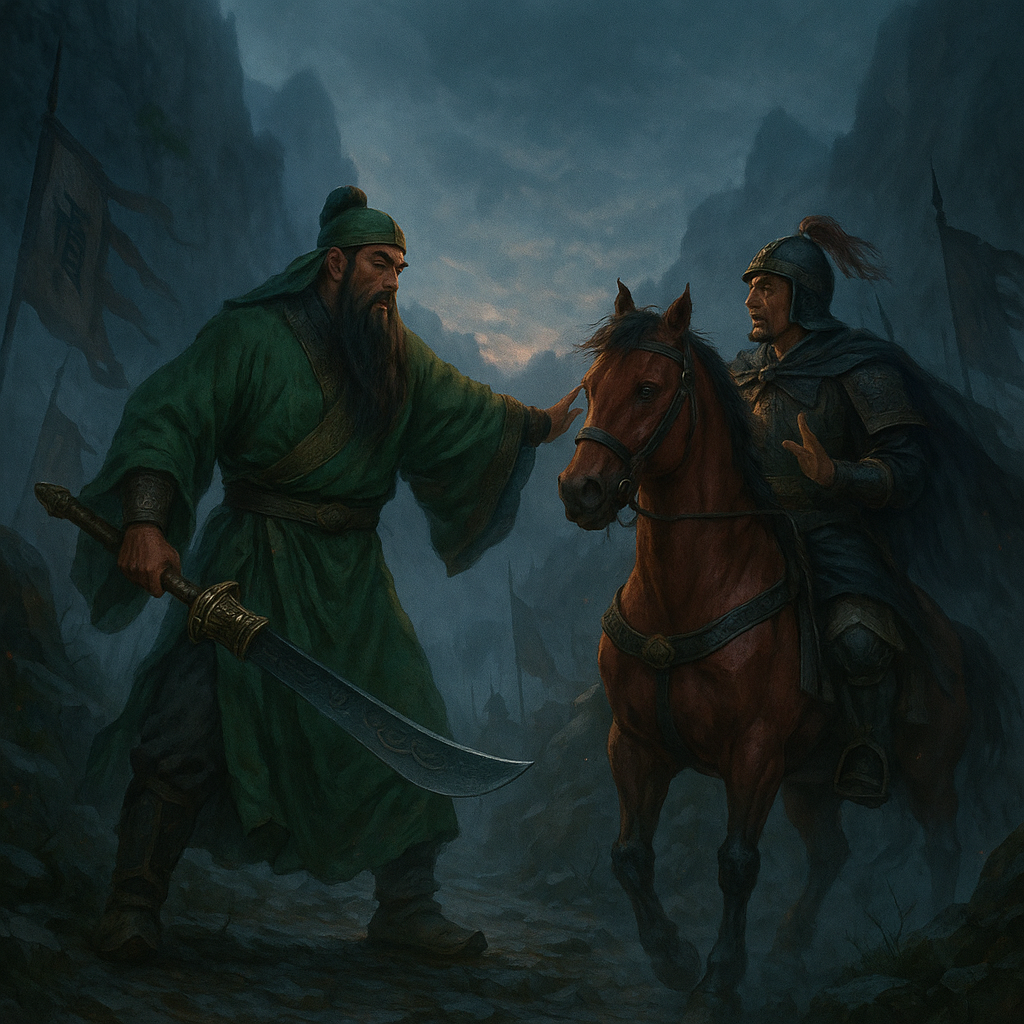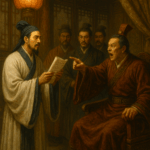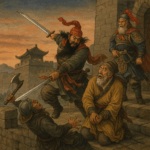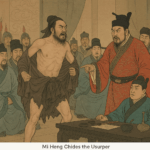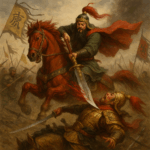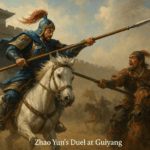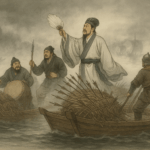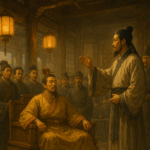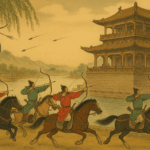That night, Zhang Liao’s arrow struck Huang Gai, sending him plunging into the river just as he bore Cao Cao ashore. Cao Cao scrambled onto land and mounted his horse amid the chaos of retreating troops. Han Dang, noticing someone calling from the helm, heard a faint cry, “My lord, aid me!” Realizing it was Huang Gai, he ordered his men to pull him out. Gai, shot through the shoulder, bit the arrow shaft and broke it off, the point buried in his flesh. Han Dang stripped away Gai’s wet clothes, carved out the arrowhead, bound the wound with a banner sash, then took off his own battle-robe and wrapped it around him. He sent another boat to carry Gai back to camp for treatment. Huang Gai, knowing he could swim, had plunged into the river in full armor in the dead of winter—but survived by his martial prowess.
Meanwhile, a line of fire ships pressed toward Cao Cao’s flotilla. From the west of Red Cliffs, Han Dang and Jiang Qin’s forces charged in; from the east, Zhou Tai and Chen Wu attacked. In the center, Zhou Yu, Cheng Pu, Xu Sheng, and Ding Feng’s main squadron bore down. Fire met steel in fierce river combat. Countless Cao soldiers were struck by arrows, burned, or drowned. A later poem lamented:
Wei and Wu clash to decide the fates of men;
At Red Cliffs, the enemy fleet is swept clean.
Flames rise up to pierce the clouds on high;
There, young Zhou Yu routed Cao Hong’s might.
Another couplet ran:
High hills and dim moon o’er boundless waves,
While the south’s sons spurn Wei Wu’s praise.
The east wind favors the young commander’s plan,
And seals Cao’s defeat at Red Cliffs’ span.
Not long after, Gan Ning led Cai Zhong deep into Cao’s camp. Ning felled Cai Zhong with one stroke, then set the camp ablaze. Lu Meng, seeing fires lit, ignited another dozen fires to support Ning’s assault. Pan Zhang and Dong Xi struck torches and drums from different directions, the roar shaking the earth. Cao Cao and Zhang Liao, with a hundred horsemen, raced through the burning forest, searching desperately for an escape. Mao Jie rescued Wen Pin, and led ten horsemen to clear a path. Zhang Liao pointed to the Wulin plain: “That wide open ground is our only route.” Cao Cao spurred his horse northeast. As he fled, a corps of enemy soldiers rushed ahead, shouting “Traitor Cao, halt!” Lu Meng’s banners emerged from the flames, and Cao ordered his men on. Zhang Liao rearguarded, fending off Lu Meng’s assault. Suddenly another force charged from a nearby valley, led by Ling Tong, who bellowed, “Ling Tong is here!” Cao felt his heart shatter. Then a third detachment charged, shouting, “General Xu Huang awaits you!” The mixed clash forced Cao’s men to break and flee northward.
It was then they spotted an encampment on a ridgeline—three thousand troops under Ma Yan and Zhang Yi, former subordinates of Yuan Shao. At the sight of the fires, they hesitated, then opened their gates and joined Cao’s retreat. Cao Cao entrusted a thousand of them to escort him and left the rest to guard the rear. In Cao’s mind, this new force offered a slender hope.
They rode ten more li, only to be ambushed by Gan Xingba crying, “I am Gan Xingba of Wu!” Ma Yan was cut down at the stirrups; Zhang Yi, charging with lance, was also slain by Ning’s blade. Cao Cao’s scouts urged him toward Hefei, but Sun Quan’s lieutenant Lu Xun had already lit signal fires there. Taishi Ci joined Lu Xun and attacked, forcing Cao to turn for Yiling. He collided with Zhang He’s force and ordered him to cover the rear.
Through the night, torches faded in the distance. At dawn, heavy clouds blanketed the sky and rain fell in torrents, soaking armor and cloaks. Cao Cao’s troops were famished and exhausted. He sent them to raid nearby villages for grain and firewood. As they gathered kindling, another detachment closed in. Panic gripped him—until Li Dian and Xu Chu appeared with a handful of advisors. Relieved, Cao Cao ordered his men onward. “Where is this?” he asked. “West of Wulin, north of Yidu,” came the reply. The terrain grew tangled and steep; Cao Cao laughed aloud from horseback. His officers asked, “Why laugh, my lord?” He answered, “Not at others, but at Zhou Yu’s folly and Kongming’s cunning. Had I lain an ambush here, how would they have fared?”
No sooner had he laughed than drums thundered. Before him stood Zhao Yun, on his faithful steed with Green Dragon Crescent Blade in hand. Cao Cao’s heart sank; he ordered Xu Huang and Zhang He to engage while he blasted through the smoke and fire himself. Zhao Yun did not pursue; instead he seized Cao Cao’s banners, letting him escape.
By midmorning, the southeast wind still blew, and rain soaked the troops through. Cao Cao ordered more foraging and made camp to cook what little they had. As they prepared to eat, another force appeared. Cao Cao panicked—until it proved to be more of Li Dian and Xu Chu’s men. He breathed easier.
A scout reported two roads ahead: the broad Yiling road, fifty li distant, or the narrow Huarong path, fifty li nearer but treacherous. Cao Cao climbed a hill to survey smoke rising from the narrow pass, while the broad road lay dark and empty. “Books say feign weakness over the narrow road, strike at the broad,” Cao Cao mused. “Kongming lit fires on the narrow to draw us in; I will reverse his ploy!” His officers bowed to his wisdom and he rode up the Huarong Road. By then the storm had turned the path to mire. Men and horses collapsed; armor and standards were abandoned in the mud.
Cao Cao rode up to find his vanguard stalled in the rain-swollen ruts. Furious, he ordered the weak and wounded to lag behind, the able-bodied to fill ditches with earth, wood, and brush so the column could move. Anyone who lagged would be executed. The procession crawled on at dawn’s light; only three hundred riders remained unbroken. Cao Cao urged them onward: “To Jingzhou for respite!”
No sooner had he given voice than a volley of drums echoed on both flanks. At the head of five hundred guard infantry stood Guan Yu, blade in hand, riding the Red Hare. Cao Cao’s army froze in their tracks. “We must fight to the death!” Cao Cao declared. His officers whispered, “Our men are spent; we cannot stand.” Cheng Yu spoke up: “General, Guan Yu owes you his life. If you petition him in person, perhaps he will let us pass.” Cao Cao agreed and spurred forward.
He slowed his horse and saluted Guan Yu: “General Gwan Yun, long time no see.” Guan Yu bowed in return: “I have awaited you by the orders of my lord.” Cao Cao continued: “My defeat leaves me no choice but to plead your mercy, General.” Guan Yu replied: “You once showed me great kindness—I have already repaid it by slaying Yan Liang and Wen Chou and lifting the siege of White Horse Plain. Today’s affair is public, not private.” Cao Cao said: “Do you recall when you slew officers at the Five Passes? That was your vow. Surely you know I spared you then for the nation’s sake?” Guan Yu, honor bound, felt his heart tremble. He reined in Red Hare and commanded his troops to stand down. Cao Cao and his officers raced past. Guan Yu called out, “Scatter and stand down!” His men dismounted and knelt, tears falling. Guan Yu hesitated—until Zhang Liao charged in. Memories of old friendship swayed him again, and he let all Cao’s party go unmolested. A later verse celebrated:
Cao Cao in defeat fled Huarong’s vale,
Only to meet Guan Yu on that narrow trail.
But for earlier kindness weighing on his heart,
He spurred his steed and let the dragon depart.
Cao Cao reached the fork of the valley and looked back. Only twenty-seven riders remained with him. Night fell near Jiangling, torches still alight, when a company stopped him—it was Cao Ren’s relief force. Cao Cao sighed in relief: “Ren, almost I saw no face of yours.” Cao Ren replied, “Though we feared defeat, we dared not stray far.” They feasted and Cao Cao ordered his officers to rest their wounds. But standing in the hall, Cao Cao suddenly wept aloud. His advisors asked, “My lord, why mourn? Your men are fed and your horses tended; soon we will regroup.” Cao Cao sobbed, “I weep for Guo Jing—had he lived, none of this would have befallen me!” And he beat his breast in grief.
The next day, Cao Cao told Cao Ren, “I must return to Xuchang to refit my army and seek revenge. Guard Jiangling well. I leave a secret garrison here: open it only if dire need arises. Meanwhile, prepare to repel Wu’s return.” He assigned Xiahou Dun to Xiangyang, Zhang Liao, Le Jin, and Li Dian to Hefei, and departed for Xuchang with the remnants of his forces, summoning the surrendered Jingzhou officials to service. Cao Ren and Cao Hong remained to secure Jiangling and Yiling against Zhou Yu.
Guan Yu rode back alone to Xiakou. His fellow generals had all recovered horses and equipment, but he returned empty-handed. Zhuge Liang and Liu Bei were celebrating at court when word came of his arrival. Zhuge Liang rose to greet him: “General, your deeds have delivered us from great peril—why do you not smile?” Guan Yu remained silent. Zhuge Liang insisted, “Surely you are displeased by our lack of fanfare?” He looked at the attendants: “Why did none of you announce his return?” Guan Yu said, “I came to lay down my life.” Zhuge Liang responded, “Did Cao Cao not pass through Huarong?” Guan Yu bowed: “He did. I could not bring myself to slay him.” Zhuge Liang asked, “Did you seize any of his men?” Guan Yu admitted, “None.”
Zhuge Liang said sternly, “You spared him out of gratitude. But the military decree stands—none may be released. By law, you must be punished.” He ordered Guan Yu’s guards forward. The chapter closes:
I’d die once to honor a friend’s debt,
Yet win immortal renown in ages yet.
To be continued…
